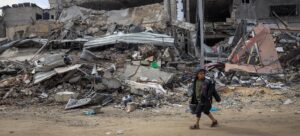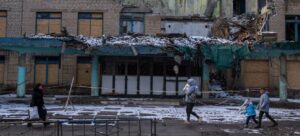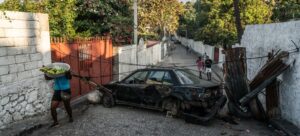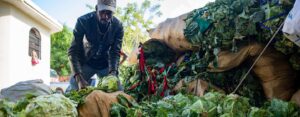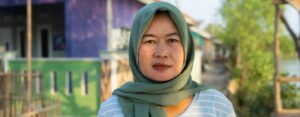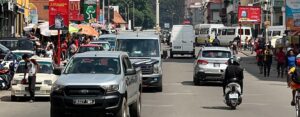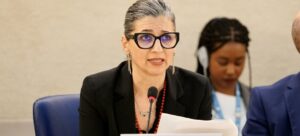The consequences have plunged the Caribbean nation into an ongoing political and humanitarian crisis. Currently, there are “unprecedented levels of lawlessness”, UNODC’s regional representative Sylvie Bertrand told UN News.
From Russian AK-47s and United States-made AR-15s to Israeli Galil assault rifles, a spike in trafficking increasingly sophisticated weaponry has gripped Haiti since 2021, said the UN Office on Drugs and Crime (UNODC) in its latest report on the illegal arms trade in Haiti.
Many of these illegal weapons are behind recent news reports of random sniper attacks, mass lootings, kidnappings and attacks on prisons to free thousands of inmates, which in turn has displaced more than 362,000 Haitians who are fleeing the violence.

More firepower than the police
Some gangs are using arms trafficking to fuel efforts to expand their reach and claiming strategic locations that are stymying efforts to halt the illegal entry of even more weapons, according to independent expert and author of Haiti’s Criminal Markets Robert Muggah.
“We have a very disconcerting and unsettling situation in Haiti, probably the worst I’ve seen in over 20 years of working in the country,” Mr. Muggah said.
Trafficked predominantly from the US, these “deadly arsenals” mean that gangs have “firepower that exceeds that of the Haitian National Police”, according to the UN panel of experts charged with monitoring sanctions the Security Council imposed on Haiti in 2022 amid worsening armed gang violence.
The problem is that as more weapons get in, the more gangs expand their control over such strategic points as ports and roads, making it even more difficult for authorities to prevent arms trafficking, UNODC’s Ms. Bertrand said.
Consequences on the ground
Some of the consequences of rampant gang violence are unfolding across Haiti.
UN-backed analysis found that almost half of Haiti’s 11.7 million citizens needs food assistance, and mass displacement continues as people flee to safety. Hospitals are reporting a sharp rise in gunshot deaths and injuries.
“The increasing number of weapons in circulation as well as the upgrading of arsenals is having an impact on the lethality and severity of the wounds being inflicted,” medical staff in Haiti told the UN panel of experts.

Mapping gang controlled areas
An estimated 150 to 200 armed groups now operate across Haiti, a country which shares the island of Hispaniola with the Dominican Republic, said Mr. Muggah, who is an independent expert on security and development.
Right now, around 23 gangs operate in the metropolitan area of Port-au-Prince, have divided into two large coalitions: G-Pèp, led by Gabriel Jean Pierre, also called Ti Gabriel, and the G9 Family and Allies, led by Jimmy Chérizier, known as Barbecue.
In recent months, the two rival factions joined forces “in coordinated attacks” targeting the airport, the National Palace, the National Theatre, hospitals, schools, police stations, customs offices and ports, “effectively forcing their will and expanding their territory”, he explained.
“Gangs are in fact controlling very strategic areas of the capital and the main roads connecting Port-au-Prince to the ports and to the land borders as well as coastal towns and areas, where we see a lot of the trafficking happening,” Mr. Muggah said.

The demand: Large-calibre and ‘ghost guns’
Arms trafficking is a very lucrative business, even in small quantities, as the demand for weapons is increasing and prices are high, the panel of experts found.
For example, a 5.56mm semi-automatic rifle costing a few hundred dollars in the US is regularly sold for $5,000 to $8,000 in Haiti.
Findings further documented the presence of “ghost guns”, which are privately manufactured with relative ease by purchasing parts online, thus avoiding the control processes that apply to factory-made firearms. These weapons are not serialized and are therefore untraceable.

The supply: US sources and routes
A small number of Haitian gangs are highly specialised in the acquisition, storage and distribution of weapons and ammunition, according to the UNODC report.
Most of the firearms and ammunition trafficked into Haiti, whether directly or via another country, originate in the United States, said UNODC’s Ms. Bertrand, adding that the weapons and bullets are typically purchased from licensed retail outlets, gun shows or pawn shops and shipped by sea.
Suspicions have also emerged of illegal operations involving unregistered flights and small airports along the south Florida coast and the presence of clandestine airstrips in Haiti, she added.
Trafficking crackdowns
UNODC has identified four trafficking routes using Haiti’s porous borders, two from Florida via cargo ships to Port-au-Prince and to the north and west coasts through Turks and Caicos and the Bahamas and others via container ships, fishing vessels, barges or small aircrafts arriving at the northern city of Cap Haitien and by land crossings from the Dominican Republic.
Most seizures made by US authorities have been conducted in Miami, and even though control agencies doubled the number of searches in 2023, authorities sometimes do not find illicit arms and ammunition, often hidden among tightly stacked packages of all shapes and sizes, according to UNODC.
To make “a significant dent in in the flow of arms in the country”, the UN agency is training “control units” in ports and airports comprising police and customs officers and the Coast Guard to identify and inspect high-risk containers and cargo and is working to facilitate their use of radar and other critical tools, Ms. Bertrand said.

International community must ‘step up’
But, security needs to be stabilised to improve Haiti’s ability to monitor and control all its borders, she said, adding that “law enforcement officers are very busy trying to contain the crisis in the streets of Port-au-Prince.”
Regarding the forthcoming UN Security Council-mandated multinational security support mission, Ms. Bertrand said it will be essential to “support the very courageous work that is already been being done by the police”.
Mr. Muggah agreed, saying that strengthening the Haitian National Police is “an absolute priority”.
“In a geopolitical environment where many of the actors are in some cases paralysed to respond”, he warned, the international community has an “incredibly important responsibility” to support Haiti in this time of critical need “because a bad situation could get dramatically worse if we don’t step up”.



